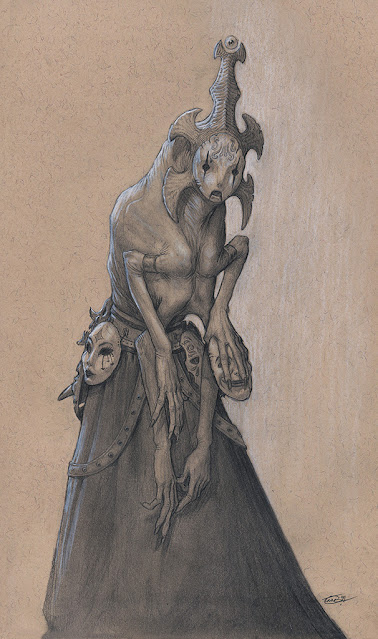 |
| What have I told you about not tracking your equipment properly? |
Or, if you prefer, ‘naturalism’, in a literary sense. I sometimes feel there is still in the hobby a pervasive sense that ‘more detailed’ means ‘more realistic’, or somehow closer to the hobby’s roots in wargames, in opposition to more impressionistic approaches, which are gamey or, heaven forfend, for ‘storygames’. I have absolutely been guilty of this.
For example: measuring encumbrance as gross weight is an abstraction, something that was explicitly addressed in early editions of D&D, where encumbrance ‘weight’ was an artificial amalgam of mass and apparent ease of transport. If you’ve ever packed a bag, you already know this—yet somehow, it’s easy to take it for granted that measuring equipment in pounds is realistic, and measuring it in slots is gamey and artificial.
Likewise, if you have ever played a team sport, or been in a stressful or chaotic situation, you probably know that it is very difficult for people to coordinate, especially if there is time pressure and some people have incomplete information or are afraid—and yet, common sense (or at least, gaming common sense) suggests that perfectly choreographed fights where everyone gets a turn, and can act according to the latest information, are normal; while asynchronous or dynamic methods of turn-taking are ‘cinematic’ or artificial.
In fact, when D&D was at its most ‘wargamey’, in the earliest editions, it was common to require players to declare actions before initiative was rolled. That was a wargame rule, because wargames are often concerned with problems of knowledge and communication. What we think of as traditional initiative is really more like a boardgame, or some genre of its own (as an aside, I think it sucks; removed from the requirement to declare actions ahead of time, it seems kind of vestigial and pointless).
I think this also applies to our position on things like players’ authorial control over the fiction. I’m currently working on a game with a ‘backwards’ inventory system. I wanted what characters are carrying to be important to play, but I didn’t want to include lots of book-keeping. One solution to this is to give each character a certain number of slots to fit supplies and equipment, which players can fill in as they play. On the one hand, this might seem like cheating, even immersion-breaking—isn’t it a bit too convenient if my character can pull out just the item they need, when they need it, and I can say it was there all along?
Actually, it’s equally cheaty, gamey, or arbitrary to say that I can and must decide, ahead of time, what my character brings on an adventure. How does my character know that they will need holy water, just because I suspect there will be undead? For that matter, how do I know that my character doesn’t know that they will need holy water? If I envision a competent adventurer who knows how and what to pack, why can’t they have planned for a contingency I didn’t anticipate?
In this case, I think what we are dealing with is less about realism, and more about player ‘stance’ (to borrow the old Forge term) relative to their character. If your character is a ‘pawn’, a piece you move around the game board in order to win, then it might make sense that you have to choose their equipment ahead of time, as part of the game’s challenge. If the character is a role you play, or an actor you direct, there is no reason to assume you should care about what they are carrying until it matters.
I actually find it more interesting to upend some of these pawn-pushing assumptions about how traditional games should be played. I also hesitate to say this is strictly about the distinction between games as competitive or ‘system-mastery’ exercises, versus other type of play, because I think you can e.g. use my reverse inventory in a game in which deciding when to use up an item slot is an important strategic decision.

